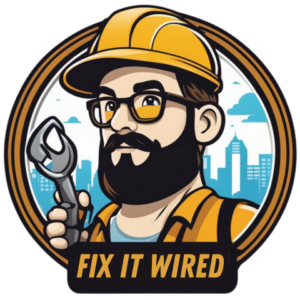People find it difficult to stay without an air conditioning unit when the days get warmer. But, if the unit refuses to turn on, it can cause stress to you and your family. This article will explain why an AC does not turn on.
Common reasons behind AC not starting are tripped breaker, blown fuses, a faulty thermostat or blower motor, clogged condensate, dirty coils, refrigerant leak, or wire issues. To fix it, check the breaker and thermostat settings, clean the condensate and coils, and replace the refrigerant tank.
There are more problems responsible for the AC not turning on. This guide will explain the reasons and what to do with the problem. You can solve some yourself, but most issues will need expert guidance.
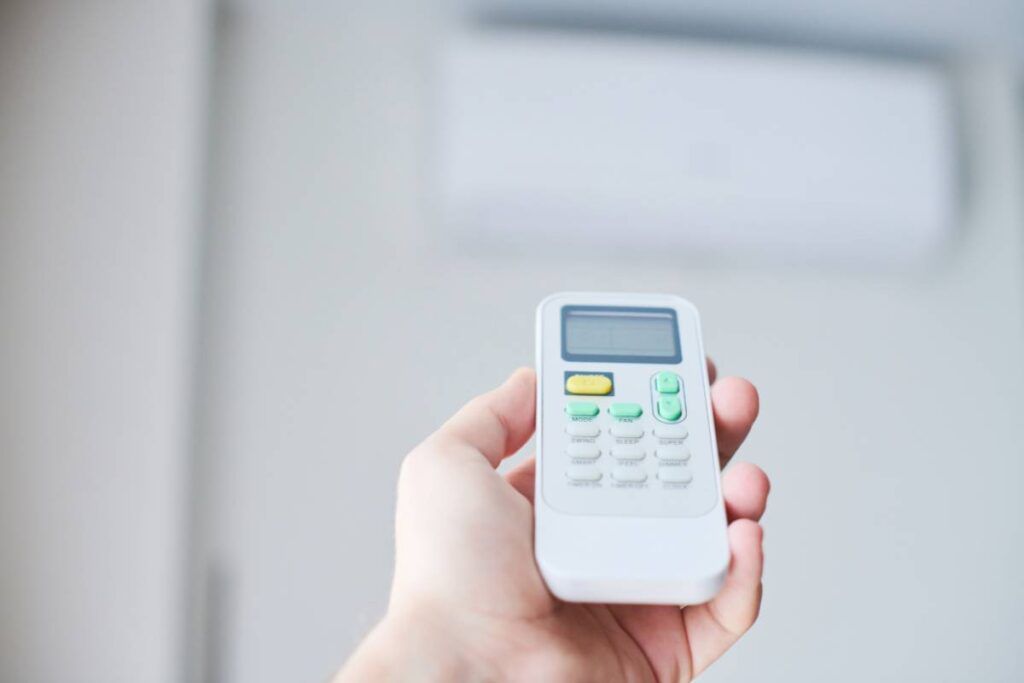
Check out our list of top-handpicked products for all your electrical, appliance, and HVAC system needs to keep your home running smoothly.
This post includes some affiliate links.Why does an air conditioning unit not turn on?
A working air conditioner is an important part of life nowadays.
You will find it everywhere, in a shop, in a working office, or at home.
An AC not working in the house can be dealt with.
But if the unit does not work well in a working space or a large-scale shop, the staff and customers will suffer misery.
The problem behind AC not working cannot be easily diagnosed, especially if there is a major one.
Some expected reasons behind an AC not starting could be:
- Power problems
- Faulty indoor blower motor
- Thermostat problem
- Malfunctioned safety devices
- Energy saving program
- Low refrigerant
- Clogged condensate
- Clogged air filters and drain pans
- Dead AC capacitor
- Dormancy
- Faulty power cord or outlet
- Incorrect AC size
- Frozen evaporator coil
Since there are so many reasons, you must find the real one and treat it. If you end up treating the problem wrong, you will have to spend more time, effort, and money on solving the problem.
Let’s explore these reasons in detail.
1. Tripped circuit breaker

A common problem behind an AC not starting is a tripped circuit breaker.
Sometimes, when a breaker powers too many appliances simultaneously, it trips off because of overloading. Heavy rains and thunder are also responsible for tripping.
However, tripping keeps your unit safe from serious issues.
If the breaker is tripped, the AC won’t start.
Find your electrical panel and check the switch for AC.
If it is tripped off, turn it to the on position.
But, if the tripping is frequent, do not reset it again. The circuit is getting overloaded for some unknown reason.
Switching the breaker on can start a fire. So, call a professional to deal with it.
2. Condenser unit unplugged
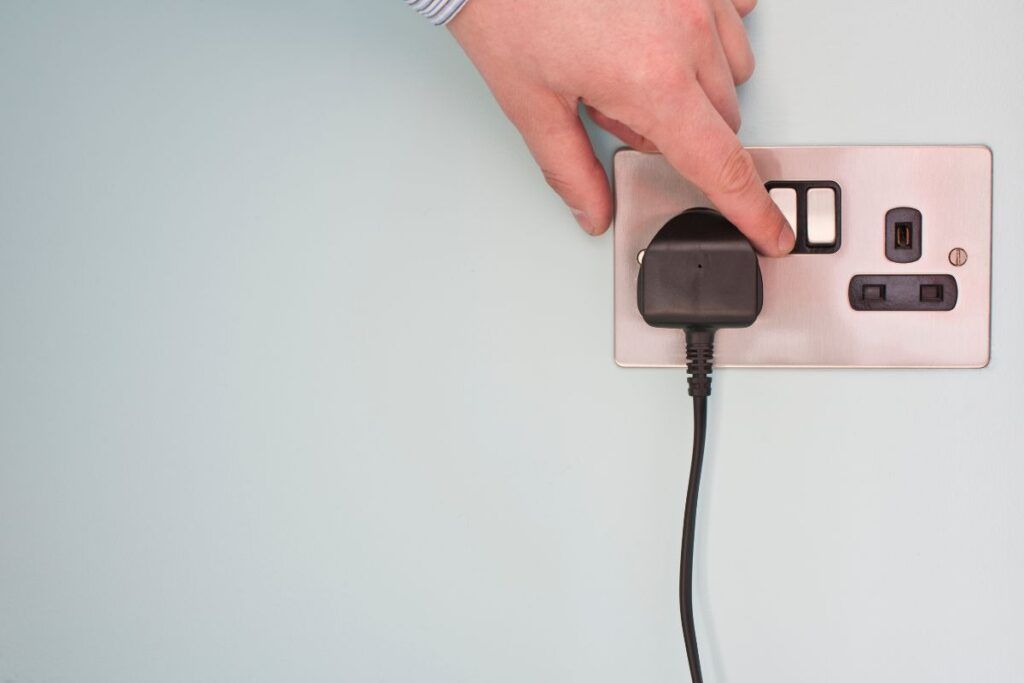
Sometimes, we need to pay attention to simple problems.
You may not have plugged the cord from the air conditioner into an outlet. It sometimes happens during a window AC.
You will see a small brown cord coming out of the air conditioner to be connected to the panel on the side of your house.
These wires may remain unplugged or get chewed, stopping the current from flowing to your AC.
Make sure the wire is plugged in.
If it gets damaged, you must change it by calling an expert.
3. Blown fuse
Your house will have a fuse box outside, near the condenser unit.
If the fuse blows, your AC won’t start.
If you suspect a blown-up fuse, you must be careful.
Before you check, turn off the air conditioner and power supply to avoid electrocution.
Pull out the fuses and consider a continuity test with a multimeter.
If the fuses do not work, buy one from the hardware store.
While buying, make sure you buy the model that suits your unit.
Take a picture of the old make and model.
4. Clogged air filter

A blocked air filter is another reason behind an air conditioner not starting.
Generally, you must change the air filter every 2-3 months.
If you have a reusable one, you can wash it, dry it, and install it back.
Over time, the air filters can accumulate dust, debris, and other air particles and block the filter.
This blocking will stop the airflow and freeze the coil.
As a result, your air conditioner will stop cooling down your house.
If the layers of ice are thick, it won’t let the unit turn on again.
Turn off the air conditioner, and open the front panel.
Slowly remove the filter and see if you can see through it.
If not, you must change it.
You can wash it and put it back if the product is reusable.
Sometimes, the filter gets broken.
In that case, you must replace the filter.
After you have changed, wait for the ice to defrost.
Otherwise, you will damage the unit.
You can use a blow dryer to speed up the process.
5. Clogged AC drain pan
Lack of maintenance will make your air conditioner drain pan clogged by dirt, debris, and moisture, especially in areas with high humidity.
The pan is located under the evaporator coil.
After that, the water flows through the drain line, directed outside the house.
The drain pan has a secondary pan to prevent the pans from clogging.
But if both are clogged, it will trigger the float switch, turning off the AC.
The safety switch is a protection mechanism to prevent excessive leakage and damage.
Use a wet or dry vacuum to suction out the blockage.
Since it can be messy, you can hire a professional to do the job.
Unless you clear the pan, the AC won’t start again.
You need to perform this task regularly.
6. Thermostat problem

When your AC stops working, wait for some time and think about the thermostat.
The thermostat malfunctioning will affect the air conditioning unit.
If the thermostat is off, it won’t signal the AC to turn it on.
Therefore, the unit will not start.
Check the thermostat batteries as well. Without a battery, the thermostat won’t work, and without the thermostat, the AC will not turn on.
If everything is fine, check the thermostat’s functioning.
Please set it to 5 degrees lower than the indoor temperature and check the AC after a few minutes.
Place your hand in front of the AC vane to see if it is passing cold air.
Check the AC components for dust buildup, blown fuses, and loose connections if the unit remains off.
Call a professional if you cannot figure it out.
7. Faulty control board
Most air conditioning units have a control board or printed circuit board (PCB).
The circuit board controls the electricity and passes it to all the small parts of your unit.
Due to this function, the problem is tricky to diagnose.
Check whether the compressor or the fan circuits are working.
If they are turning on, the control board is the culprit behind an AC not starting.
Check the manual carefully if you want to solve the problem yourself. Otherwise, call for an expert’s help.
8. Low refrigerant
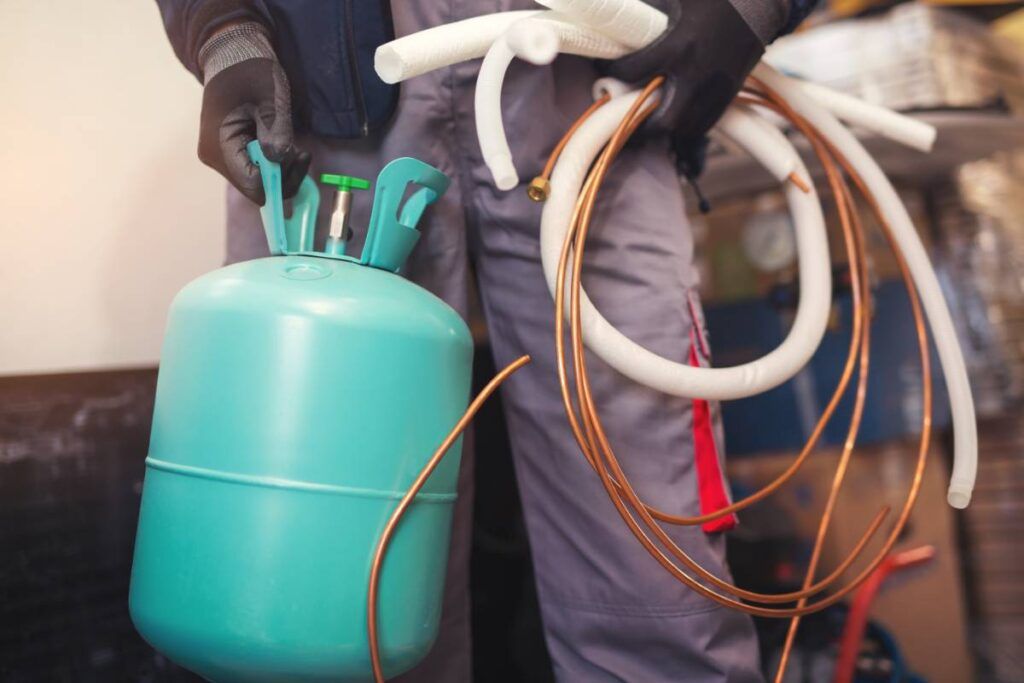
The refrigerant is a cooling fluid that sends cold air throughout your house.
The fluid is mainly responsible for providing enough cold air throughout the house.
Low refrigerant is not because the unit uses it up.
But, it can also be due to refrigerant leakage due to cracks or rust.
The cracks can happen over time due to old age and corrosion.
You need to replace the refrigerant tank and refill it.
Please turn off the unit at the breaker box and drain the refrigerant by siphoning it with a plastic hose.
Find signs of leakage, crack, or erosion.
Contact your manufacturer to get the right refrigerant tank and fluid.
You need an expert’s help to do this job.
Once everything is done, please turn on the unit to check whether it is working.
9. Dead AC capacitor

The air conditioner’s capacitor is sensitive to heat.
There are two types of capacitors:
- The start capacitor delivers voltage to start the motor.
- The run capacitor supplies energy to keep the motor running.
Overheating will make your AC work harder to make the room cold and get the desired temperature.
The unit may get very hot if it is installed on the roof.
During extreme temperatures, you must avoid setting the temperature to the highest or lowest on the thermostat.
It will make the unit work harder, causing an overheated or dead capacitor.
Power outages and frequent fluctuations can also damage the capacitor.
You can install a power surge protector to prevent the capacitor from getting affected due to power outages and fluctuations.
Old age can cause the capacitor to die and reduce its energy.
In that case, you have to replace it.
You can understand old age through regular maintenance.
Replace the capacitor if it is dead.
Do not try to replace it yourself as there are electrical charges stored. Hire an expert to do the job.
If you suspect and confirm that the capacitor is dead, do not forcibly run the AC, as that can burn the motor.
Replacing the motor further will be expensive.
10. Malfunctioned safety switches
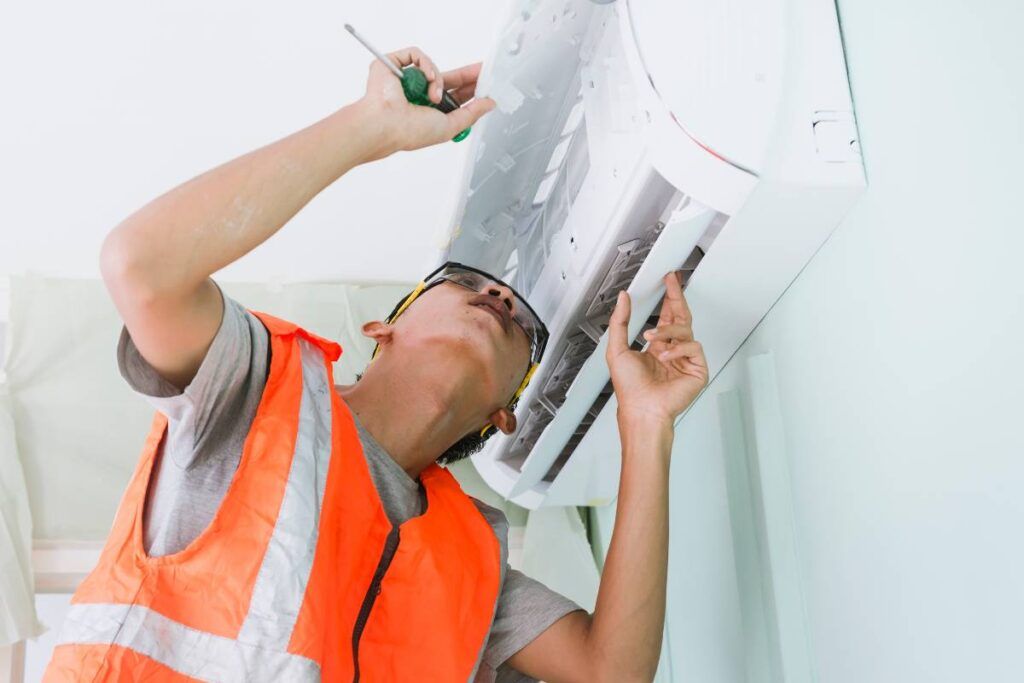
There is a float switch inside the air conditioner.
Most systems have a float or wet switch for safety, and both work to prevent excessive overflow.
The switch activates to shut off the AC when the drain pan is filled with excessive water.
Check your unit and find if water is pooling at its base.
If the switch is at fault, it won’t let the AC turn on.
You need to call a professional to confirm the problem and fix it.
11. Dirty condenser

The outside unit of your air conditioner is called the condenser.
It releases the heat to the environment collected by the internal unit.
The condenser will become dirty if your AC does not receive regular maintenance.
As a result, it will work harder to dissipate the heat because the accumulated dirt will act as an insulator.
When the condenser draws too much current, it trips the breaker and stops the AC from turning on further.
Only cleaning the condenser will not solve the problem.
Besides, if a dirty condenser leads you to this place, you are late for cleaning.
You will need a professional clean-up.
Improper cleaning will damage the compressor coil fins, which is more destructive than an uncleaned condenser.
You can prevent this by regular maintenance of the unit.
Clean the condenser from time to time to prevent this problem.
12. Damaged motor
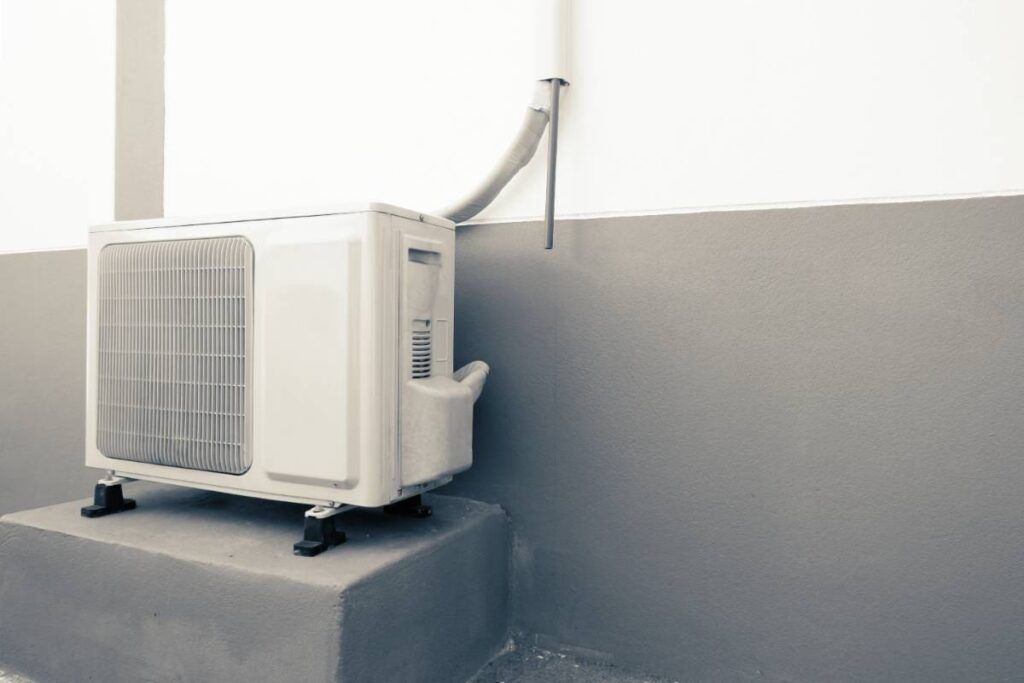
When you hear a grinding noise from your air conditioner, it indicates malfunctioned motor blades.
The motors remain sealed to prevent contact with any outside air, water, or dirt.
But due to old age, the sealing will come off, and the oil sealed within the motor will come out.
Without the oil, the motor will wear out and stop working.
The outside air fails to evaporate the heat if the motor is damaged.
You need to replace the motor blades if they cause problems.
Call an HVAC team to replace the motor if the motor is at fault.
13. Faulty power cord or outlet

Sometimes, the issue is a simple one. For example, the power cord might have been frayed and worn out.
It happens if you have stored the unit for a long time without using it or due to frequent power outages.
Check the cord for signs of damage. You will have to replace it.
Sometimes, the outlet does not let the unit turn on.
Check the outlet by plugging the cord of any other appliance.
If the appliance does not start, then the outlet is the culprit.
You need to call the electrician to fix the outlet and the cord.
You cannot repair the cord or the power outlet yourself.
You could risk getting electrocuted in the process if you are not careful.
14. Dormancy
Sometimes, AC not turning on is a dormancy problem.
Suppose the cooling system lies idle during the winter, and you have turned it on again when summer arrives.
In that case, the fans inside the unit find it hard to start rotating again due to the dirt buildup.
You can call an HVAC expert to start the fans manually.
You can solve the problem once the fan comes out of dormancy and starts on again.
15. Improper unit size

If your AC is not turning on, it could be due to the unit’s wrong size.
A small unit must work harder to give your room the desired temperature.
On the contrary, a large unit will take up too much power and struggle to remain in the ‘on’ position.
So, if the unit size is incorrect, it will not turn on after some time.
In that case, you must replace it and buy a new one.
You cannot, of course, do it yourself.
Please consult an expert team before deciding and ask for the right aircon size.
16. Your AC has run its course
If your AC has been your companion for a long time, and now it is not starting, it is simply because its lifespan has ended.
But how do you confirm it? Here are some ways:
- The airflow will decrease slowly even after regular maintenance.
- Your AC will need repair now and then despite the regular maintenance.
- The bills will increase. When the lifespan ends, the AC will overwork to reach the desired temperature. For this, there will be a surge in your electricity bills.
- The AC is leaking inside too much.
- AC will make weird noises like grinding, screeching, rattling, etc.
- Your AC will smell bad despite regular care and cleaning.
If your AC experiences any of the above signs and the unit is quite old, you must replace it with a new one.
However, do not make the decision yourself. Before buying, consider consulting an expert for confirmation.
17. Energy saving program
You can enroll to receive a discount on your energy bills if you have energy programs.
For example, Maryland has a BGE Smart Energy Savers Program.
Participating in this program will make the HVAC system of your house turn off during peak electrical times.
So, if your air conditioning unit is not turning on, the reason is the energy-saving program.
If you suspect this, wait for your AC to get turned on the next day.
Otherwise, there is another issue.
18. Locked aircon control

Most air conditioners are mounted on the wall and use a remote control.
You may have accidentally turned on the locked feature in the remote.
As a result, the unit won’t start even if you try to turn it on by powering it up.
The remote has locked the unit to stay in such a condition.
You can understand the problem by looking at the digital screen of the remote when you turn the button to ‘on.’
Different units have different settings.
Usually, holding the ‘+’ and ‘-‘ signs or the higher and lower degree buttons together can disengage the lock button.
You can check your manual before doing anything.
Final thoughts
There are many reasons behind an AC not turning on.
Sometimes it is for silly reasons, like a switch not turned on, a breaker tripped off, thermostat issues, cord or outlet not working, dormancy, or a lock switch engaged.
Other times, there could be serious reasons, for example, dirty condenser, air filters, blown-up fuse, dead capacitor, clogged condensate, low refrigerant, faulty control board, etc.
Before you troubleshoot any problem, consider finding the right one.
You cannot do it yourself. Call an HVAC expert to help you out.
Do not let the problem stay for a very long time.
Otherwise, that can give rise to some other issues.
